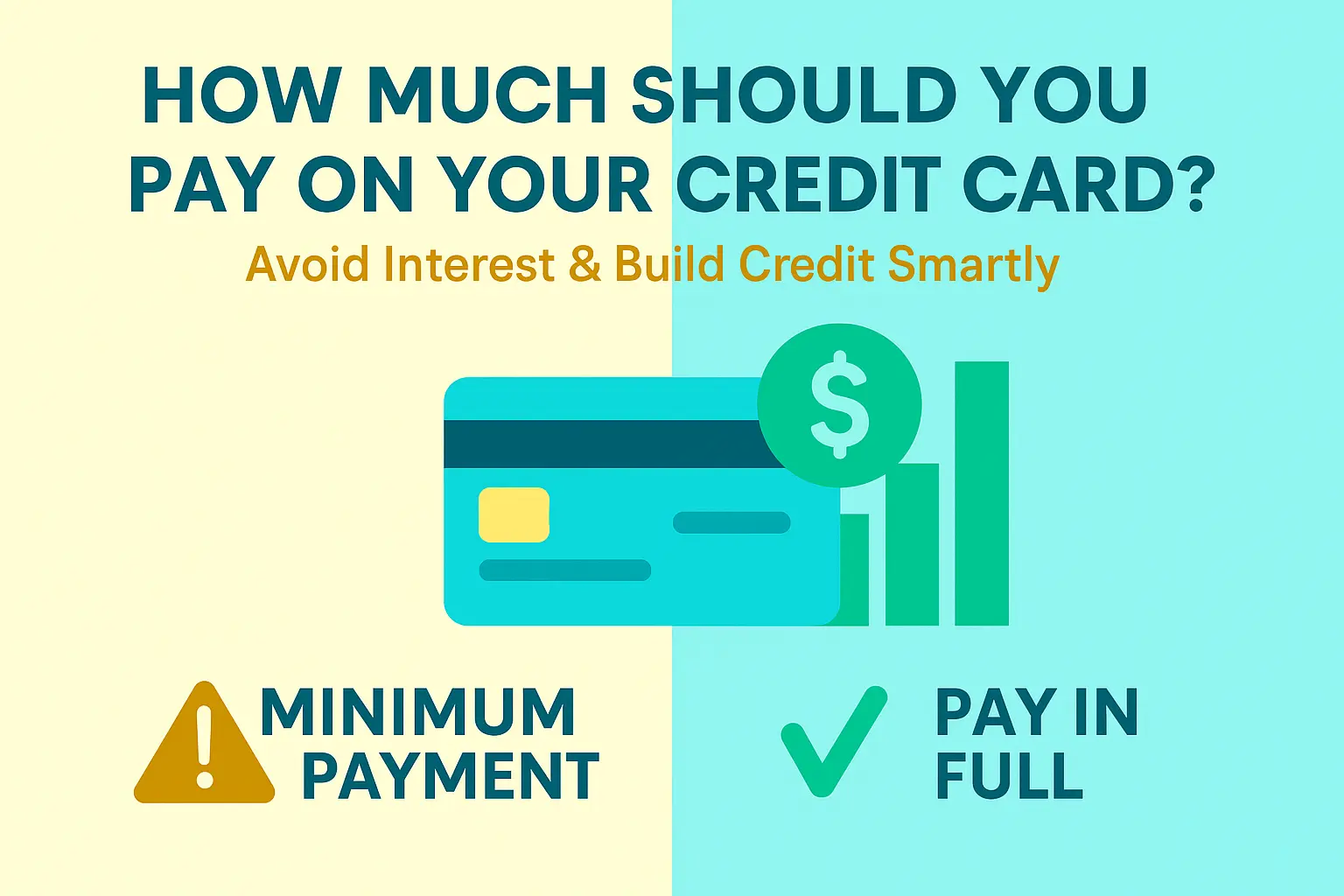Find out how much you should pay on your credit card to avoid interest and manage debt smartly.
Table of Contents
If you’ve ever asked yourself “how much should I pay on my credit card?”, you’re already ahead of the game. Whether you’re building your credit score, avoiding interest, or managing monthly expenses, understanding how credit card payments work is key to smart financial living.
In this guide, we’ll answer common questions like:
- How much more than the minimum should I pay?
- If I pay the minimum, can I use my card again?
- Will I be charged interest if I only make the minimum payment?
- What really happens when you pay more than the minimum?
Let’s break it all down.
Why Paying More Than the Minimum Matters
Every month, your credit card issuer offers a minimum payment option. This is usually 2–3% of your total balance.
But here’s the catch:
Paying only the minimum is expensive. You’ll likely pay hundreds—if not thousands—more in interest and stay in debt for years.
What happens if you only pay the minimum?
- You still accrue interest on the unpaid balance.
- It takes years to clear your debt.
- Your credit utilization stays high, potentially hurting your credit score.
Pro Tip: Always aim to pay as much as you can—preferably the full statement balance.
How Much Should I Pay on My Credit Card Each Month?
Here are three smart payment options:
- Pay in full: Best option. Avoids all interest and keeps your credit in great shape.
- Pay more than the minimum: If you can’t pay in full, pay at least 2–3x the minimum.
- Use a payoff calculator: A “how much should I pay on my credit card calculator” helps you figure out the best payment amount based on your interest rate and budget.
Example:
If your balance is $1,000 and your minimum payment is $30, try paying $90–$120 to reduce interest significantly.
What Happens If I Only Pay the Minimum Payment on My Credit Card?
Let’s say you owe $3,000 at a 20% APR.
If you only pay the minimum (around $90), it could take more than 12 years to pay it off—and cost you over $4,000 in interest!
Conclusion? Paying just the minimum is a debt trap.
If I Pay the Minimum on My Credit Card, Can I Still Use It?
Yes, you can still use your credit card after making the minimum payment—as long as you’re within your credit limit and not past due.
But remember:
- Your available credit is reduced by your unpaid balance.
- Carrying a high balance can hurt your credit utilization ratio, which affects your score.
How Much More Than the Minimum Should I Pay on My Credit Card?
There’s no one-size-fits-all answer, but here are some guidelines:
- Double or triple the minimum: It’s a good start.
- Aim for at least 10% of your balance.
- Set a goal to pay it off within 6–12 months, not years.
Use a free tool like Credit Karma’s payoff calculator to plan your payments.
If I Pay the Minimum, Do I Get Charged Interest?
Yes. Unless you pay your entire statement balance, you’ll be charged interest on the remaining amount.
The only way to avoid interest?
Pay the full balance by the due date.
Even if you pay just $1 short of your total balance, you’ll still be hit with interest charges.
What Happens If You Pay More Than the Minimum Balance?
Here’s the good news:
Paying more than the minimum has real financial benefits, such as:
- Less interest paid overall
- Faster debt payoff
- Lower credit utilization
- Better credit score over time
The more you pay, the more you save.
How Much Should You Pay on Your Credit Card? – Insights from Reddit
We took a look at Reddit’s r/personalfinance threads, and here’s what real people say:
“Always pay in full unless you’re in an emergency.”
“Carrying a balance is how banks get rich, not you.”
“If you can’t pay it off in 3 months, you probably can’t afford it.”
Reddit’s verdict? Pay in full, or pay big.
How Much Should I Pay on My Credit Card Calculator
If you need help planning your payments, use an online credit card payoff calculator. It considers:
- Your current balance
- APR (interest rate)
- Desired payoff time
- Monthly budget
Recommended tool: Credit Karma’s Debt Repayment Calculator
FAQs
How much should I pay on my credit card to build credit?
Pay the full balance or as much as you can. Consistent, on-time payments are the key.
Can I pay just $1 over the minimum?
Yes, but it won’t make much difference. Try to pay significantly more than the minimum.
Does paying more help my credit score?
Yes. It reduces your credit utilization, a major factor in your credit score.
Will I lose rewards if I don’t pay in full?
No, but you might end up paying more in interest than you earned in rewards.
Final Thoughts: Pay Smart, Stay Debt-Free
Your credit card can either be a helpful financial tool or a debt burden—it all depends on how you use it. Here’s the bottom line:
- Always pay in full if possible.
- If not, pay more than the minimum—2–3x at least.
- Use a calculator to plan your strategy.
- Avoid interest, protect your score, and get out of debt faster.
Take Action:
Review your budget, check your statement, and commit to paying more this month. Your future self will thank you.
Recommended Reading:
⚠️ What Happens If You Only Pay the Minimum?
- 🔁 You pay interest on the remaining balance every month.
- 🐢 Slower debt payoff – it may take years to clear your balance.
- 📉 Lower credit score due to high credit utilization ratio.
- 💰 Pay more overall – potentially thousands in extra interest.
💡 Pro Tip: Use a credit card payoff calculator to plan faster and smarter payments.

Hi, I’m Sandip Bhange, the person behind MyFinancePolicy. I’m a civil engineer who developed a strong interest in banking and personal finance over the years. I started this website to share clear, honest, and easy-to-understand information that can actually help people in their daily financial decisions.


1 thought on “How Much Should You Pay on Your Credit Card?”